- Home
- Jack Hamlyn
Necrophobia - 01 Page 14
Necrophobia - 01 Read online
Page 14
Ricki said nothing for a time so I did. “What do you think?” I asked her. I suppose I was hoping her woman’s intuition would tell me there was nothing to worry about.
“I think it could go either way,” she said.
“Well, you’re cheerful.”
“What do you want me to say, Steve? You want me to lie to you?” She glared at me and then turned away. “I just don’t know any more than you do. All we can do is hope, hope that the disinfecting took care of it. He seems fine. I like that. I guess if he’s still okay in twenty-four hours we’ll have reason to be optimistic. If there’s nothing in forty-eight, then I would think it just didn’t take and we’ll all have reason to be thankful. Even you, Steve.”
That last one was a barb, of course, at my lack of faith. Ricki believed in God and I never tried to talk her out of it. With me, faith came hard. I’d seen too much ugly shit in my life. There was so much suffering and evil in the world that the idea that it was all part of God’s plan was ludicrous. What soured me further were the power plays, greed, and sex abuses of organized religion. It made me sick. When I combined all that with the millions that had died in the name of a higher power, there was no faith to be had. The well ran dry.
I thought, though, if Davis pulled through I might think differently.
I just wouldn’t believe it until it happened. I guess I was a hard-headed realist and I had no patience with the invisible world, with things that you could not see, smell, hear, taste, or touch. Maybe I was a pessimistic idiot. And maybe I was the only rational one.
I kept an eye on Davis.
He sure seemed fine. I kept trying to find faith, I kept reaching my mind out to another that was bigger and omnipotent. I prayed. I hoped. I despaired. I was bitter. I was resigned. Circling around in the back of my mind was fear. Cold, irrepressible fear. I fought it off at every turn. I would not submit to it…yet, I could not exorcise it completely. It haunted me as I suspected it haunted all of us that day. I was worried sick about Davis. Have you ever had to deal with a sick kid? And I’m not talking about an outbreak of flu or a head cold or a broken leg. I’m talking life-threatening here. It happened to us the year before my Guard unit got activated and shipped to Iraq. Paul got very sick and ended up in the hospital for a month. It was a very long month. He was out of it, sweating and shaking, but mostly sleeping. They diagnosed him with a severe bacterial stomach infection that spread throughout his entire system. It got into his brain and he had convulsions and seizures. They doped him up so much that he barely woke day after day. They fed him intravenously. By the end of the second week, he improved. Then he got worse. Then he improved. Then he got worse again. It was like a bouncing ball and the ups and downs nearly destroyed us.
Finally, he improved dramatically.
A week later it was like he’d never been sick.
Three months later it was like one of those awful nightmares that faded through the day until you can’t recall it. But I remember what it was like. I remember how angry and hopeless I felt. I thought he would die. I thought the call would come when I wasn’t at his bedside and then it would be time for a funeral. My boy would never come home. I’d never hear him laugh or see him smile and I knew, oh yes, I knew that I would never be the same again, that something in me would die with him.
I guess what I’m trying to say here is that it’s bad when an adult has a life-threatening illness. But when a child has one it’s devastating. To see your kid in that hospital bed and you can’t do a damn thing about it. You blame yourself. You blame the doctors and nurses. You get paranoid. A sick adult is minor in comparison and if you’ve never experienced it, consider yourself lucky. Because you may think you’ve suffered, you may think you’ve had it tough, but you’re a virgin in a lofty castle in the sky. You have no idea what true violation of your soul is, what it’s like to be dragged through the dirtiest, darkest gutter imaginable.
That’s what I feared the most.
Feeling that way again.
True, Davis was not my kid. But I loved him. I think we all did. Maria and he were great kids. The best. To lose one of them was going to scar us badly. And to watch him slip off (as I’d watched Paul…or nearly) would be like a catalyst to all the horror and frustration we all were feeling.
But I wasn’t going to let the anxiety and sickbed doldrums control me.
By noon he was still fine.
Then within the hour he spiked a fever.
I’m not going to go into a detailed analysis of what came next, I’ll just touch upon the basics. It started when Davis claimed his stomach felt funny. He vomited. Then he spiked a fever, like I said. And it was like turning on a hot tap: sour-smelling perspiration beaded his face and within minutes he was soaking wet. We got him into bed. Ricki, Diane, and I watched over him. Jimmy took Maria and Paul up into the panic room. Tuck was there. The four of them played around. Tuck, I knew, wouldn’t get within ten feet of Davis by that point. We did what we could for him. He was hot to the touch like his blood was boiling. His system was under attack by an invasive organism and it was throwing everything it had against it. He began thrashing in bed and we had to hold him down. He complained that his bite wound was burning. We gave him painkillers but they wouldn’t touch it. His eyes rolled back in his head. His nose ran. He drooled and gnashed his teeth. He screamed, he went into violent convulsions. And then he started doing the most horrible thing: he started chewing through his own lips. We got a tongue depressor in his mouth and he bit it in half. He shrieked. He raged. He screamed at us.
And then he went still.
While Ricki and Diane held him, he went limp and died in their arms.
What I did next I did not to play the macho man, but to spare them the horror that was coming. Diane took Ricki out of the room. I stayed in there by myself and waited. It was a wake. A vigil. Jimmy kept checking on me, peeking in every fifteen minutes without fail.
“Not yet,” I’d tell him.
I waited an hour, then two, then…Davis began to tremble. I touched him. He was cold and dead. The feel of his flesh made me pull my hand away. His fingers began to wiggle. His back arched and he let out a low, throaty sighing that was more of a moaning. His ragged lips pulled back from his teeth. Then his eyes opened. There were perfectly white, the pupils like black dots. He looked at me and drool ran from his mouth.
I grabbed a pillow and pressed it down over his face.
He thrashed.
He made gurgling sounds.
His teeth chattered.
His hands clawed at me.
I put the barrel of the Sig-Sauer where I knew his forehead was and jerked the trigger. Then he was at peace. I walked from the room and Jimmy and Diane were standing there.
“It’s done,” I said.
Then I found a basin and threw-up.
THE SIEGE
We wrapped Davis up in his blankets and took him down to the crib. Jimmy and Tuck and Diane went out with CAR-15s and killed the zombies they found. There were about a dozen stragglers. Tuck said we should burn the body and we knew he was right. We built a pyre of sticks and logs then put the little blanket-shrouded form atop it. Tuck doused it with kerosene and lit it up. It was a huge blaze and it burned through the afternoon and into the evening. Even after dark it was still smoldering.
We weren’t in very good shape after that.
Ricki and Diane explained it all to Maria (save for the shooting/burning part) and she accepted it easily. Too easily. An hour later she began to cry and she was inconsolable. The girls couldn’t get her to calm down. We all felt so goddamn hopeless. The cure she needed we couldn’t give to her, so she sought her own: she crawled into Tuck’s lap and held onto him like she never wanted to let go. I heard him say, “It’s okay now. It’ll be okay now. Hold on tight…just keep holding on. I’ll never let you go. Never. SShhh.” There were tears in his eyes and I had to walk away.
I followed Diane out onto the dark walkway, my eyes running wet. She lit a cigarette an
d I bummed one off her. I hadn’t smoked in years, save for a time in Iraq when the stress got the better of me. The first drag tasted like shit and made me cough. The second drag made me feel sick to my stomach as the nicotine mainlined. The third tasted wonderful and therein lays the horrible nature of addiction. I finished the cigarette and tossed it over the rail.
I had to keep it together.
Ricki joined us out there and I held her. Then Diane held the both of us. It was hard. It was all very hard.
The only thing that pulled us apart was the helicopter.
I’d told you that I’d seen them now and again, but at high altitude. This one wasn’t much more than a few hundred feet off the ground. It buzzed over the tower and circled the compound with spotlights sweeping the ground beneath it. I think it was a Blackhawk. An unarmed scout chopper. It flew over the road outside, illuminating the zombies out there and probably targeting them. It was hard to know in the dark. I wondered what the pilot must have been thinking. Probably out on recon flight to find the dead and he finds the tower and the compound, security lights burning.
The chopper came and went quickly enough.
But its spots showed us that there were not just a few dozen of the dead out there or even forty or fifty, but what looked like hundreds milling about, an army of them. There was enough that it scared me, really scared me, because I could easily see them pushing their combined might against the fence and the gate coming right off its hinges. Let’s just say that I didn’t sleep too well that night, not too well at all.
By dawn, the situation had worsened.
In fact, it was downright ugly.
Tuck woke me up and when I got out there Jimmy was already there and so was Diane. Outside the fence the numbers had doubled again. They were not holding back now: they had pressed up to the fence and the voltage didn’t seem to be bothering them at all. They were beating on it and clawing it, mulling and active and wanting in. I sensed a desperation to them I hadn’t seen before.
“I think we better lay the rest of those Claymores,” Tuck told me. “If they make it this far, I want to thin them as much as possible.”
“Need my help?” Jimmy said.
“No,” Tuck told him. “I want you right here with the spotting scope. We’re taking the walkie-talkies. Keep us posted.” He turned to Diane. “Go wake Ricki and tell her the situation. Tell her we might need to move out at a moment’s notice if things get bad. We’ll need to start getting things together just in case.”
We went down to the crib, gathered up the Claymores and ringed them around the tower for maximum effect. We wired them together, preparing for the very worst. Before hooking them up to the clacker we went and out to the barn and got the Jeep and a similarly-armored Chevy Tahoe. I left Castleberry’s suburban there. It was of no use now. We gassed the vehicles up and filled extra cans with fuel and made them ready in case we got overrun.
Back in the tower, everyone was chipping in and packing food and weapons and provisions in case the worse came to worse. Maria was helping, too, her eyes red and puffy from crying. I knew that my world had changed immensely in the past month but I had to wonder what it was like for her. Young, fragile…her parents dead, her brother dead. Now she was stuck with a bunch of strangers that looked like they were preparing for D-Day.
We were in good shape by noon.
That’s when the first helicopters showed. I saw a Blackhawk and two Kiowas. They passed over the zombies but made no runs at them. Things were getting tense. Between the zombies massing out there and the military taking an interest in them, things were getting decidedly dicey. We made sure we were well-fed, prepared, and dressed for a run.
Tuck had a radio and got on it, trying to raise somebody, anybody, but he wasn’t getting through. Then, a few minutes before two, the first sorties came. F/A-18 Hornets came screaming over the trees and dropped clusterbombs that went off in rapid succession blanketing the road and the zombies with explosions that made the tower shake. Out by the fence there was fire and smoke and flying debris. The next sortie dropped more clusterbombs and it would have been all right if they had stopped there. The zombie masses were obliterated but further sorties destroyed the fence, blowing off the gates and tearing big holes everywhere when it didn’t knock it right down.
It wasn’t good.
Because after the Hornets were long gone, the zombies were regrouping again. Maybe not hundreds as before, but waves of twenty and thirty at a time that had survived the bombing. They pushed forward, swarming, crossing the fence and spreading out over the compound. Tuck flooded the trench with fuel oil and fired an incendiary into it and it went up with a resounding WHRUMP! pushing a wave of heat back at us. It further slowed the progress of the dead. Many were coming down the road, but others were trying to wade through the oil and were incinerated and still others went up in blazing pyres, wandering around, flaming. Others pushed into the minefields and the mines went up one after the other: THUMP! THUMP! THUMP! They did not kill the zombies. They just mutilated them…tearing open legs and feet, slowing them down but hardly stopping them.
“They’re still coming!” Ricki said, watching them approach with her spotting scope. She was out on the walkway with Diane and Jimmy.
“Hell yes, they’re everywhere now,” Jimmy said.
Diane scanned the fields with binoculars. “I’m counting at least fifty or sixty coming in from the north,” she reported. “Heavy weather ahead, man.”
I went out there and it was chaos. The fence line was destroyed, of course, the landscape pitted from the clusterbombing. Black smoke was roiling in the air from the bombs and from the burning fuel oil that blazed with a greasy stink that seared my nostrils.
Tuck flooded the secondary trench and lit it up.
It ignited with a rushing, whooshing sort of sound and, again, the heat rolled at us. I didn’t think firing the secondary was a good idea because it was already bad enough out there with the smoke and fire and heat. From the walkway it looked like a boiling, steaming witch’s cauldron. We had to shut the hatch after a few minutes because the air was so hot and so thick with smoke. But what I saw before we did was the very thing I’d always been worried about: the blazing fuel oil had lit up the surrounding dry, uncultivated fields and now they were burning, too. I think the compound was about as close to Hell as I could have imagined.
“We’re going to have to get out of here,” Tuck said. “At least for awhile until it burns itself out.”
“That fire is going to destroy our crops,” Diane said, very pointedly. She’d mothered those fields, she nurtured them with blood, sweat, and tears. She didn’t get pissed off easily. But right then, she was as hot as the fields beyond the tower. “It’s going to destroy everything. Did you have to light that oil on fire? That was fucking stupid, man, just plain fucking stupid.”
“I’m trying to save our asses!” Tuck shouted at her.
Diane just shook her head. “Yeah, well I hope your escape plan isn’t a clusterfuck like this.”
Tuck just stared at her, trying to intimidate her but it did no good. She stared right back at him.
“Diane, knock it off,” Ricki told her. “He’s done everything for us. We’re alive because of him.”
“Shut up, Polyanna.”
“Don’t you call me that!”
Diane rolled her eyes. “Lookit me I’m Sandra Dee.”
Ricki boiled.
“Okay, that’s enough,” I said, getting in-between them. “We’ve got enough problems without bickering.”
This was a really, really stupid time to start picking at each other. Realistically? I agreed with Diane. I thought the minefield and the Claymores were a good idea. But I never liked the idea of the fuel oil. The chances of collateral damage were too high. That fire would burn everything. It would roast the zombies like marshmallows but at the same time it would leave us with a barren compound.
I told Tuck we needed to get down to the crib to wire the Claymores to the clacker
but he was in a foul mood by then. “I’ll do it,” he told me. “I’ll blow a hole through them and then I’ll get the trucks over here.”
“I’ll come with.”
“Suit yourself.”
That was one thing about Tuck. I loved the guy and respected him but he had a stripe of pride running through him a mile wide. He did not like his efforts questioned even when they didn’t work out so good. He’d brood for awhile, I knew, but he’d get over it. We were in the shit now. I thought it could not get any worse but I was wrong, very wrong. Tuck was in his element now and I could see that. He lived for combat and for many years he’d had none save an occasional bar fight. He was probably more alive now with the zombie pandemic than he’d been since the Vietnam War.
We got down to the crib.
The dead were out there. We could hear them pounding on the security door. Scratching and clawing at it. Tuck had cut gunports on all sides of the crib and we could see that there were probably only eight or ten zombies hanging around outside the tower. The real menace were the dozens moving in from the fields. The haze of dust and smoke out there was a thick pall, but the wind moved it away from time to time enough so that I could see the numbers coming at us.
“What do you got?” Tuck called out to me.
“I got at least twenty to the north and maybe ten or more from the west,” I told him.
“Got three times that many coming down the road, another thirty to the south. Let’s draw them in.”
Tuck wired the Claymores to the clacker and got ready.
I kept an eye out the gunports. They were massing now. I watched them coming. Many were battle-scarred: burnt and blasted, missing limbs or with gaping wounds from the bombing. But it did not slow their steady inexorable march.
I got on the walkie-talkie. “Ricki,” I said. “Get everyone and everything down to the second level. When we move we’re going to have to move fast.”
“Got ya,” she said.
The throng of the dead were within ten feet of the Claymore line now.

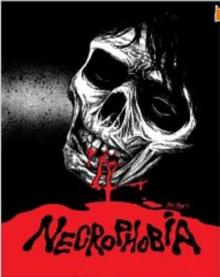 Necrophobia - 01
Necrophobia - 01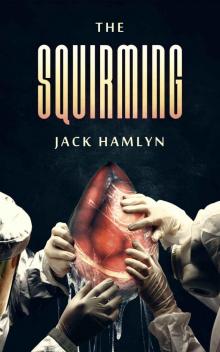 The Squirming
The Squirming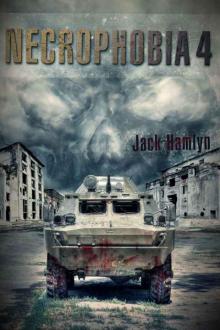 Necrophobia 4
Necrophobia 4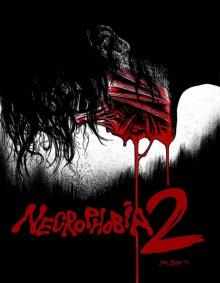 Necrophobia - 02
Necrophobia - 02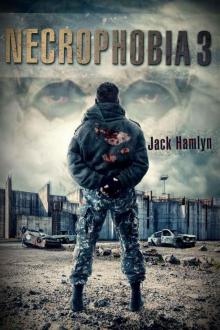 Necrophobia #3
Necrophobia #3